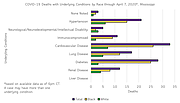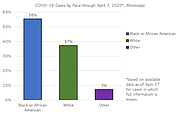New MSDH data confirm that 72% of COVID-19-related deaths and 56% of reported cases come from Mississippi’s African American population. Previously, State Epidemiologist Dr. Paul Byers warned that “more than 50%” of COVID-19 cases and fatalities were found in black Mississippians. Photo courtesy State of Mississippi
More than half of all Mississippians currently diagnosed with COVID-19 and nearly three-fourths of the virus’ current casualties are African American, the Mississippi State Department of Health revealed today. The race demographics confirm fears that the impact of the virus will be disproportionately distributed amongst the state’s black communities.
In recent weeks, the Jackson Free Press has repeatedly asked for racial breakdowns of COVID-19 testing, infection and mortality. Yesterday, at a press conference with Gov. Tate Reeves, State Epidemiologist Dr. Paul Byers acknowledged that more than 50% of COVID-19 infections and fatalities in Mississippi occurred in African Americans. The state health agency released detailed demographic data this morning.
Statewide, COVID-19 cases rose by 88, rising to 2,003 total across Mississippi. MSDH reported eight more fatalities, meaning 67 Mississippians have now died from complications from the novel coronavirus. MSDH released no new information on total statewide testing this morning. Yesterday, Byers confirmed that testing numbers, derived from the state’s Public Health Lab and private labs across Mississippi, reflected only complete tests.
Racial demographics for testing totals have yet to appear on MSDH’s daily breakdown. That information may take time to discern. Rep. Jarvis Dortch, D-Jackson, said in a morning interview that State Health Officer Thomas Dobbs communicated to him that “around a third” of lab reports did not mention the patient’s race. Some clinicians reaching out to the Jackson Free Press on background confirmed that their reporting mechanisms for COVID-19 testing at private labs do not include ethnicity. Data for confirmed infections and fatalities, Dortch said, is likely still demographically accurate.
Mississippi Legislative Black Caucus Chairwoman Sen. Angela Turner-Ford, D-West Point, called for sustained action to arrest the spread of COVID-19 across the state.
“I’m almost speechless. As quickly as we can, we need to try to intervene to slow the trend,” Turner-Ford said in an interview with the Jackson Free Press, adding that without a more aggressive testing regime, the state’s current understanding of the spread of COVID-19 may speak more to pre-existing health disparities than the virus’ actual extent.
“I do think that what we’re seeing is based on the underlying health of Mississippians that have contracted the virus. Chronic health conditions, like high blood pressure, diabetes, that’s going to dictate how your body responds to the virus,” she said this morning
MSDH data back up Turner-Ford’s analysis. Alongside the racial trends in COVID-19 infections and mortality, the state health agency released a breakdown in fatalities by underlying conditions, also sorted by race. Virtually all the state’s deaths so far have occurred in patients with comorbidities, including but not limited to cardiovascular disease, lung disease, renal disease, hypertension and diabetes. Racial disparities persist in these comorbidities as well, Dortch said.
“We know that the black community lacks access to affordable healthcare,” Dortch said, including preventative care, adding that the state has under-invested in health care and social services, which could reduce the spread of these conditions. “Mississippi works hard to stay in last place. It takes a lot of effort to have the kind of inequalities we have in this state,” Dortch said.
Mississippi Senate Minority Leader Derrick Simmons, D-Greenville, told the Jackson Free Press in an interview that COVID-19 highlights the stark failures of the American healthcare system. “COVID-19 is consistent with what healthcare officials and politicians and pundits already know about this country as it relates to health. We are in a state of healthcare denial,” Simmons said, adding that “For the African American community, it’s even worse.”
Simmons joined Turner-Ford and Dortch in calling for a thorough examination of the socioeconomic dimensions of the crisis. “I would like to see the data regarding those individuals who had access to healthcare out of the 56% of cases and 72% of fatalities in Mississippi who are African American,” Simmons said.
“Our black community is disproportionately working in jobs exposed to the public. We’re working in retail jobs, frontline jobs for the government,” Dortch said. Many black Mississippians, he explained, did not have the privilege of an office job which allowed some measure of social distancing.
“I believe that (it relates) to socioeconomic status, if you’re not healthy, if you don’t have the resources to seek proper medical treatment, when something like coronavirus comes across, you can just expect the most horrific outcomes,” Turner-Ford said.
Simmons lamented the prevention that Medicaid expansion could have afforded the state of Mississippi’s most vulnerable communities. “Medicaid expansion is Mississippi’s greatest failure in the modern day. We failed to expand health coverage to 300,000 Mississippians. We’re talking about 10% of the population of Mississippi.” And that investment could have paid dividends beyond just providing insurance, he added.
"We could’ve created 9,000 plus jobs in the health care industry. And while we’re looking at a shortage of PPEs and ventilators, what we’re overlooking is the personnel needed in this crisis. If we would have expanded Medicaid, at the very least we would have had more heroes on the ground to fight this crisis,” Simmons said. The senator from Greenville called on state leadership to acknowledge the extent of this crisis, and to take action. “It’s time for Mississippi leaders to stand up and be the Christians that they profess to be,” Simmons said.
Read the JFP’s coverage of COVID-19 at jacksonfreepress.com/covid19. Get more details on preventive measures here. Read about announced closings and delays in Mississippi here. Read MEMA’s advice for a COVID-19 preparedness kit here.
Email information about closings and other vital related logistical details to [email protected].
Email state reporter Nick Judin, who is covering COVID-19 in Mississippi, at [email protected] and follow him on Twitter at @nickjudin. Seyma Bayram is covering the outbreak inside the capital city and in the criminal-justice system. Email her at [email protected] and follow her on Twitter at @seymabayram0.
More like this story
- Gov. Reeves Says Virus At ‘Plateau’; State Reports Most Deaths in Single Day
- Governor Under Fire as COVID-19 Spreads, Testing Begins at Fairgrounds
- COVID-19 Affects Black Mississippians Disproportionately; MDOC Workers Test Positive
- COVID-19 Cases Continue to Climb as Healthcare Infrastructure Suffers
- Mississippi’s Healthcare System In Imminent Danger, Stressed MSDH Officials Warn
More stories by this author
- Vaccinations Underway As State Grapples With Logistics
- Mississippi Begins Vaccination of 75+ Population, Peaks With 3,255 New Cases of COVID-19
- Parole Reform, Pay Raises and COVID-19: 2021 Legislative Preview
- Last Week’s Record COVID-19 Admissions Challenging Mississippi Hospitals
- Lt. Gov. Hosemann Addresses Budget Cuts, Teacher Pay, and Patriotic Education




